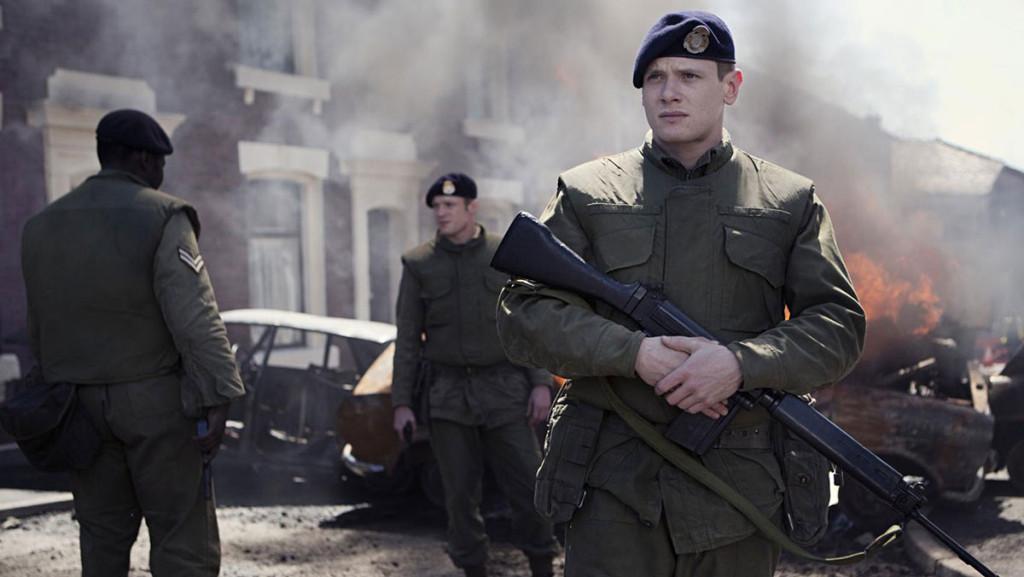1971: The Troubles have just barely begun for the people of Northern Ireland. Not a single night passes in Belfast without the distant screams of rioters. Neither the pub nor the hospital is safe from explosions and gunfire. The town is a ticking time bomb, painted yellow by cold street lights and reeking of dirt and blood. Right in the center of it all is Britain’s military, met with angry Irish violence. After the quick escalation of a house search into a full-on riot, young British soldier Gary Hook (Jack O’Connell) is stranded in enemy streets to fend for himself against the Irish Republican Army. Thus begins the riveting manhunt for Hook that is Yann Demange’s directorial debut, “’71.”
Against a political backdrop of nationalist and sectarian strife, no one in Belfast is to be trusted and nowhere is safe. Hook’s struggle to remain hidden from his pursuers is consistently hair-raising. He is forced to disguise himself, hiding in civilians’ houses while unsure whether they will rat him out. All the while, the soundtrack is pulsating drums and echoing guitar as the high stakes keep the audience’s hope for Hook on edge.
Every character Hook encounters is a welcome example of war taking its toll on the homefront. A young Protestant boy (Corey McKinley) who first meets and offers him help is a foul-mouthed and violent street hoodlum just shy of alcoholism. Later on when Hook is taken in by Eamon (Richard Dormer), a former war medic, the years have caused the doctor to become disillusioned with the prospect of army life, and he tells Hook the military has no use for him other than as a meat bag with a gun. Even within the IRA, the young Irish boy Sean (Barry Keoghan) leads a somewhat normal life but is stuck between IRA fighter and civilian.
“’71” brings to film the harrowing journey of abandonment in enemy territory and is reminiscent of Ridley Scott’s 2001 war thriller, “Black Hawk Down.” However, the film takes a quieter approach to the genre than Scott’s typically epic scope. Nearly half of the runtime is silent. The magnificent script by Gregory Burke more than makes up for any lost dialogue though. Cinematically, the camera could stand to shake a little bit less, especially during action sequences when it almost seems as though an earthquake has struck the set. What dominates the cinematography is the lighting and use of effects, creating beasts out of the people of Belfast, contrasting Hook who is rewritten into a half-dead shamble, wandering through the alleyways of hell. Because of this, even the British military training course looks serene and beautiful when compared with the city.
The cast is tremendous in portraying their utter enmity with one another. O’Connell, from the start, garners sympathy from the audience and touches on the relatable side of every soldier when they first begin in the military. The men who portray members of the IRA are able to convince the audience of their cause even though they are radical. At times, it seems that their actions against the brutal police forces that govern Northern Ireland are justified.
Unfortunately, the flaws in the film are not negligible. The cast’s performances can’t save the film’s nearly complete lack of character development. While there are a few diamonds in the rough, such as Eamon or the Protestant boy, very little detail goes into anyone else’s personality. Many of the characters are indistinguishable from one another. This leads to confusion at times because the film’s inky darkness paints them all in the same light: none. Hook has no personality traits whatsoever, and too much film time is spent trying and failing to develop Sean’s characteristics. On top of that, the historical backdrop is only a skeleton of what it could have been. Though it is intelligent, it is not enough to distinguish the Irish conflict as anything but a generic war, causing the film to plateau. The script and cinematography try to make up for this deficit, but ultimately cannot.
“’71” is a commendable first film for Demange. Fans of history or war movies, or anyone with a real taste for script, will undoubtedly find the film pleasing. The actors carry it well and the thrills of war don’t fail to send adrenaline rushing through the viewers. But, for the praise that it has been given, it is a tad overrated. What little character development it has is compounded rather acutely by the lack of historical representation.




















